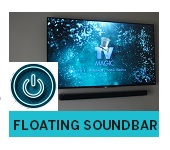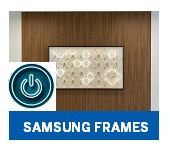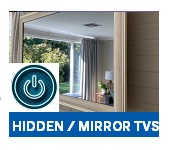Do Expensive Speakers give you the best sound? True or false?
A: YES & NO
Achieving the best audio quality is all about the quality of your speakers, IS THIS TRUE?
In the audio industry there is no limit to the amount that can be spent on audio components. For example high end speakers range from $5000 - $40,000 per speaker! (We're talking commercial, industry used speakers used in a Birch Carroll & Coyle cinema or at a rock concert). On the other hand, in your home cinema we're dealing with what is known as 'processed' digital audio (0's and 1's).
Recording audio is done on a digital level in this day of technology. In the days of vinyl record the microphone (a physical & mechanical receiving device) transfers a collected vibration (sound) and it was recorded in those days, in an analogue fashion onto the vinyl. This is obviously the highest quality sound on earth (still) as there is no 'messing with' the raw vibration.
The only weakness with vinyl is - storing raw footage is like trying to cram a 250,000 songs onto a small memory card which can only fit 300 songs:- A vinyl record struggles to hold thirty (30) minutes of audio! And you need a wall to wall cupboard to hold all your records. Hence digital synthesizing was born.
However, as soon as technology attempts to replicate this raw process in an imitated (digital) world we're losing the quality from this analogue to 0 & 1's down-scaling process. In a sense, we're attempting to replicate the human eye, as a digital camera does. Yes, digital cameras and TV resolutions are now getting very, very life like. However, they are still incomparable and will never-ever, come close to what the human eye can see as a raw lens.
The typical material you would view/listen to in one of the home cinema packages will include DVD's (incl. Bluray), TV, Pay TV, Music, MP3's, and perhaps CD's. All of these sources have been digitally synthesized in the recording process. This digital audio signal is processed by your amplifier which must reconvert those 0's and 1's to analogue again before it travels down the speaker cable and comes out of your speaker. The sound you hear from a speaker is once again, a raw & earthly analogue frequency but because the raw source has been 'messed with' the quality is never-ever quite the same as if you were there physically to hear it with your own ears.
To clarify this, an audiophile with a well trained ear cannot pick the difference between good quality speakers (decent quality) and a $40,000 speaker in a $500,000 home cinema if he/she is listening to a poor quality mp3 or your average DVD/TV program. This is why limits should apply on the expenditure of speakers; limits should be guided by your intended use and intended listening sources.
There are of course new and improved technologies emerging all the time. Digital synthesizing is becoming more and more life like and the quality of digital audio is improving tremendously as the storage spaces grow rapidly in performance allowing huge amounts of information to be stored on very, very small spaces. This is improving the audible quality once again and good quality, high-end gear is needed because cheap junk will disappoint you.
Other Articles of Interest:





















